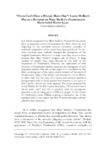If you Can’t Have a Friend, Make One: Lucky McKee’s May as a Revision on Mary Shelley’s Frankenstein

Ver/
Use este enlace para citar
http://hdl.handle.net/2183/17037Coleccións
Metadatos
Mostrar o rexistro completo do ítemTítulo
If you Can’t Have a Friend, Make One: Lucky McKee’s May as a Revision on Mary Shelley’s FrankensteinAutor(es)
Data
2008Cita bibliográfica
AEDEAN 2008, 31: 217-223 ISBN-978-84-9749-278-2
Resumo
[Abstract] It is widely recognized that Mary Shelley’s Frankenstein has always been an important source of inspiration for films. Since the very beginning of the twentieth century, countless examples of cinematic adaptations of the novel have been produced. In fact, these revisions have radically changed the perception of the original Frankenstein. Moreover, in some cases they are even more popular than Mary Shelley’s original tale of horror. A large number of articles have been devoted to the field of the adaptations of Frankenstein. However, the appearance of new revisions of Frankenstein renders necessary the emergence of new actualized studies. The aim of this paper is to contribute to this field, analysing one of the latest covert versions of the myth of Frankenstein: May; a film written and directed by Lucky McKee in 2002. May tells the story of a lonely and mentally disturbed young woman who is finally pushed into insanity in her quest to find a perfect friend that never appears. The motto proposed by Lucky McKee for his film is quite descriptive, “If you can’t have a friend, make one”, and this is precisely what the protagonist proceeds to do by using parts of different people. In his version of Frankenstein, Lucky McKee is going to denounce one of the principal evils in our society: the lack of moral principles and real affection bear monsters.
ISBN
978-84-9749-278-2





